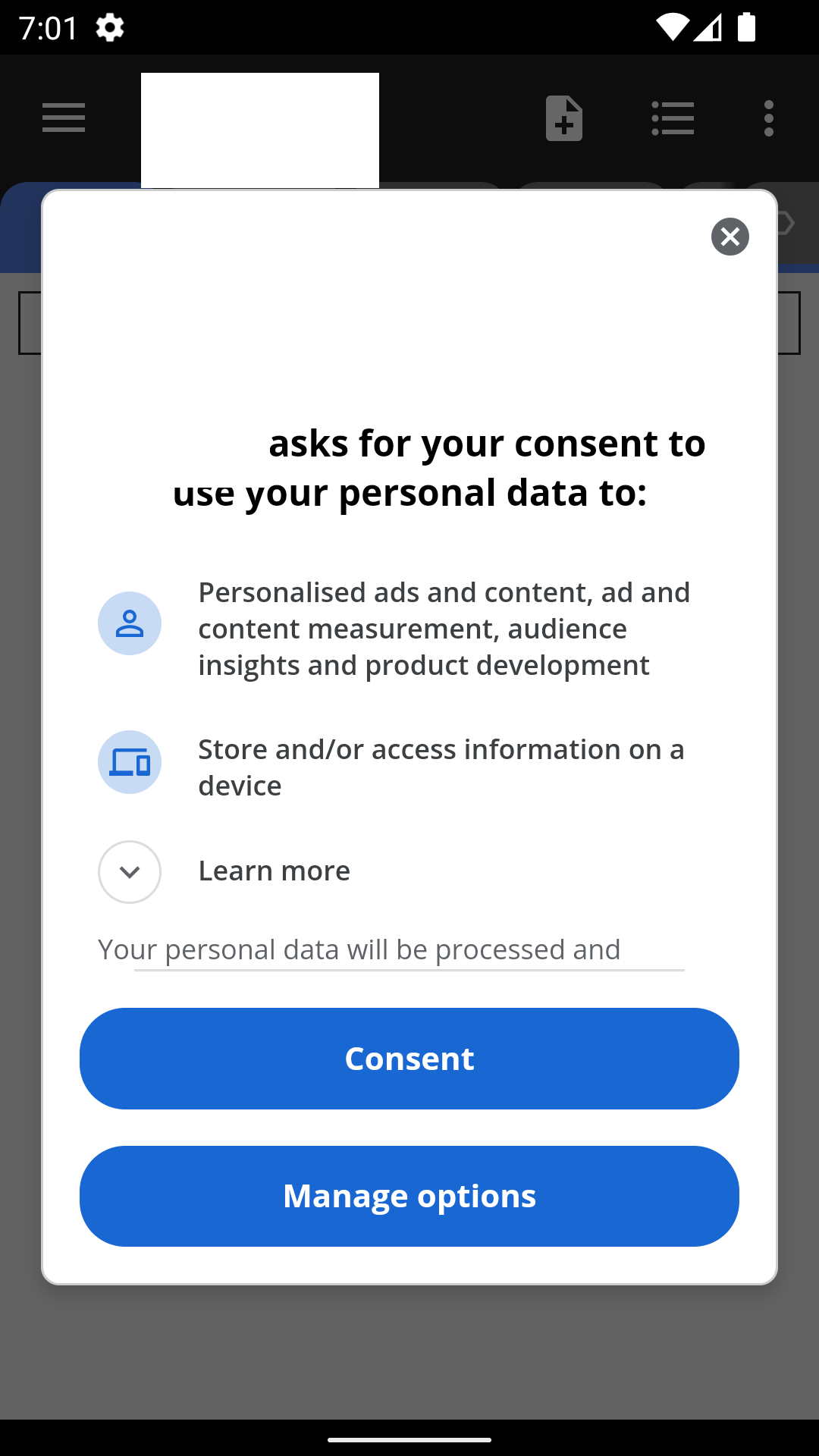How we can implement GDPR using User Messaging Platform SDK, without affecting income from Europe?
yanchen...@gmail.com

- Get personalised ads
- Get non-personalised ads
- Pay to remove ads

- Agree to consent. Get ads (I am not sure whether they are getting personalised ads or non-personalised ads)
- Close the form (Tap on top right) to not agree consent. User will not get any ads?!
- We will not generate any income from Europe users
- We will not getting in-app purchase (to remove ads) income from Europe users
Haydo
If they select "Manage options" and deselect everything and accept, then you can check in the Shared Preferences of your app to see if they consented or not and then restrict some or all of the app and provide an option for them to pay for the ad-free version or reset their consent preferences.
Have a look at the answer here for information on what consent information is saved to the Shared Preferences: https://stackoverflow.com/questions/69307205/mandatory-consent-for-admob-user-messaging-platform
Mobile Ads SDK Forum Advisor
Hello,
Thank you for reaching out to us.
By default, if the user has not yet been prompted with the consent form, they will be served personalized ads. However, once the user has been prompted and opts out, they will only be served non-personalized ads. If they do consent, then personalized ads will continue to be served.
To answer your concerns:
- Agree to consent. Get ads (I am not sure whether they are getting personalised ads or non-personalised ads)
- The user will be served personalized ads until they opt out and they will be served non-personalized ads.
- Close the form (Tap on top right) to not agree consent. User will not get any ads?!
- Closing the consent form does not mean that the user did not agree and will not receive ads. The UMP SDK will assume that the user has not opted out of being served personalized ads and therefore will still be served personalized ads.
The in-app purchase implementation must be handled with your own message prompt instead of the UMP SDK.
Feel free to reach out to us if you have any further concerns or inquiries.
Thanks,
 |
Mobile Ads SDK Team |
Mobile Ads SDK Forum Advisor
Thank you for the additional input. Feel free to reach out to us if you have any concerns or inquiries regarding Mobile Ads SDK implementation.
Thanks,
 |
Mobile Ads SDK Team |
Andreas
yanchen...@gmail.com
- Personalized ads
- Non-personalized ads
- No ads shown because user does not consent
- Perform in-app purchase or in-app subscription to remove ads
- Agree to consent, to show personalized ads or non-personalized ads
Mobile Ads SDK Forum Advisor
Hi,
Thank you for your response.
With regard to your concern, if users choose to not consent at all, then the ads that will display will be non-personalized ads. However, as per this article (https://support.google.com/admob/answer/9760862?hl=en&sjid=2418371235660772237-AP), for non-personalized ads, consent for cookies or mobile identifiers is still required because non-personalized ads still use cookies or mobile identifiers to combat fraud and abuse, for frequency capping, and for aggregated ad reporting. If consent is missing for Google for Purpose 1 in the TC string, Google will drop the ad request and no ads will be served. Kindly note that the default serving of ads is personalized ads.
ath...@gmail.com
Mobile Ads SDK Forum Advisor
With regards to preventing missing consent for Purpose 1, a good way of doing this is to limit app functionality until the user consents. If the user does refuse consent, it's up to your implementation on how much are you going to limit the app's functionality. You are unable to obtain this consent without the user's deliberate input.
The circumstances where consent for Purpose 1 will be missing in the TC string would be either that the user has not yet been prompted or the user did not consent whether or not your using UMP SDK.
With that, if you do not have Purpose 1 in the TC string, you will not be served ads. In line with our existing EU User Consent policy, consent for cookies or mobile identifiers is required for both personalized and non-personalized ads. For non-personalized ads, consent for cookies or mobile identifiers is still required because non-personalized ads still use cookies or mobile identifiers to combat fraud and abuse, for frequency capping, and for aggregated ad reporting. If consent is missing for Google for Purpose 1 in the TC string, Google will drop the ad request and no ads will be served.
ath...@gmail.com
Mobile Ads SDK Forum Advisor
Thank you for responding back. Allow me to raise your concern to a wider team to provide precise insight. I'll let you know the soonest I hear back from them.
Mobile Ads SDK Forum Advisor
Thank you for inquiry. To answer the question about ads related to no consent, in the absence of consent a user can still receive ads such as limited ads. This may inherently result in a no fill.
For being able to tell what type of ads a user consents for, the UMP SDK writes the TCFString, which is comprised of many bits that can no longer be translated into a single boolean for "personalization". However, you can read the TC String per the spec and use that to proceed with how you want your app to function.
Thanks,
Justin
ref:_00D1U1174p._5004Q2mBX1O:ref
